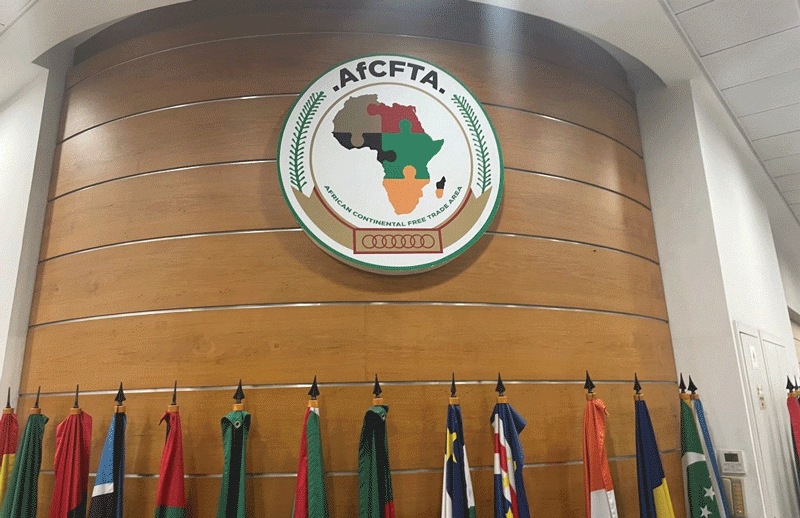
THE African Continental Free Trade Area (AfCFTA) remains a “transformational project” for the continent, but its success depends on building strong financial ecosystems, investing in infrastructure, and expanding trade finance for small businesses, the African Export-Import Bank (Afreximbank) has said.
In its 2025 African Trade Report, released during its annual meetings in Nigeria this week, Afreximbank underscored that without these foundations, Africa cannot transition from exporting raw commodities to fostering industrial-led growth through regional value chains.
The bank’s call to action comes amid growing momentum around continental trade integration, as African leaders and financial experts gathered to chart the path forward in a volatile global economic environment.
The continent has been pushing for collective action to bridge Africa’s US$100 billion annual infrastructure gap and expand access to trade finance — critical steps to turn the AfCFTA’s vision into reality.
“The AfCFTA remains a transformational project,” Afreximbank’s said in the report released on Wednesday.
“However, trade integration must be underpinned by strong financial ecosystems, investment in infrastructure (both digital and physical), and small and medium enterprise-focused trade finance to deliver on its promise.
“Only then can Africa create regional value chains that replace raw commodity dependence with industrial dynamism.”
The report highlights growing global fragmentation, shaped by geopolitical tensions, economic nationalism, and digital disruption, and warns that African economies cannot afford to adopt a reactive stance.
- Why Maser CEO Suri thinks AfCFTA is a winner for start-ups
- AfCFTA bolsters Zim SMEs
- Outcry over state of Binga-Dete road
- Why Maser CEO Suri thinks AfCFTA is a winner for start-ups
Keep Reading
“African solutions, led by African institutions, are not only viable but essential,” it said.
To achieve the AfCFTA’s vision, the report advocates for a unified African front involving governments and financial institutions working together to shape development strategies.
“The emergence of a collective African voice, as epitomised in the African Union’s G20 membership, must be leveraged to demand fairer rules and shape reforms to the multilateral development finance system,” it said.
“Strategic partnerships with emerging economies and with Brics members and the Global South can complement this.”
The report calls for greater investment in domestic capacity and digital innovation to help the continent assert itself on the global stage.
“If Africa backs its institutions, digitises smartly, and speaks with one voice, it can define a more resilient and inclusive future for its economies and people,” the report reads in part.
Wamkele Mene, secretary-general of the AfCFTA secretariat, said the agreement has now been ratified by 49 AU member states, the fastest ratification of any AU economic framework in history.
“This rapid uptake shows unprecedented political will and unity behind a single African market, one with a GDP of over US$3,4 trillion, 1,4 billion people, and the world’s youngest population by 2050,” he said.
“This market will unlock African entrepreneurship, drive industrialisation, and create millions of jobs, shifting us from raw commodity dependence to value-added growth.”
Mene noted that progress was already visible, with tariff reductions and simplified customs procedures underway.
Terrance Drew, Prime Minister of the Federation of Saint Kitts and Nevis, stressed the importance of solidarity between Africa and the Caribbean in the face of global uncertainty.
“We must come together. The greatest risk today is not reaching too far — it is failing to reach at all,” he underscored.
“Afreximbank has understood this. It has not just spoken about Pan-Africanism — it has invested in it. The Caribbean seeks partnership — we offer creativity, resilience, human capital, and market potential.”
Nigeria’s Vice President, Kashim Shettima, in a speech delivered on his behalf, said Africa must move beyond mere resilience toward economic renewal.
“That means mobilising blended finance to crowd in private capital for infrastructure and green transition,” he noted.
“That means deepening regional value chains anchored in AfCFTA and powered by scalable industrial policy.
“That means strengthening financial institutions that meet trade demand with new capital, governance frameworks, and risk-sharing facilities.
“And also, that means ensuring that transformation is inclusive, reaching our youth, our SMEs, and our women entrepreneurs. Colleagues and friends, the future is not something we wait for.”
Samaila Zubairu, president and CEO of Africa Finance Corporation, called on member states to work with African financial institutions to ensure they remain resilient.
“We do that by truly respecting the laws of our respective countries, where we have already empowered these institutions with the immunities and privileges required for them to continue de-risking opportunities in their domestic territories and to mobilise capital at scale for growth within the continent," he said.
“So it's important that we continue to work together to advance development and accelerate development impact for our people. We understand the terrain, we are invested in the outcomes, we have skin in the game.”
Running under the theme ‘Building the Future on Decades of Resilience’, AAM2025 focuses on accelerating trade opportunities, driving investment, and fostering innovation.
It ends tomorrow.






